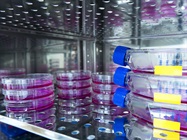
What are laboratory incubators used for?
Laboratory incubators provide a controlled, contaminant-free environment for safe, reliable work with cell and tissue cultures by regulating conditions such as temperature, humidity, and CO2. Microbiological incubators are used for the growth and storage of bacterial cultures.
Types and sizes abound, including dry bath incubators with single or dual blocks, biological oxygen demand (BOD) units ideal for insect or plant studies, shaking incubators, hybridization ovens, bioreactors, and a wide variety of laboratory test chambers. Finding the correct size for your particular application is an easy task, with sizes ranging from small tabletop units to room-size. Laboratory incubators are essential for cell and tissue culture, biochemical and hematological studies, pharmaceutical work, and food analysis.




How do I choose a laboratory incubator?
The size and capacity of the incubator is the first, most basic consideration. Estimating the number of samples that will be incubating at any one time will give a general idea of the proper internal volume. What temperature, humidity, and CO2 ranges will be necessary for your work, and will a water source be required?
To ensure even heat distribution and elimination of cold spots, incubators can be water-jacketed or air-jacketed, or another source of direct heat can be used. For CO2 incubators, controller options include thermal conductivity detection (TCD) or infrared sensors.
Incubators offering design features that ensure regulatory compliance are well suited for use in accredited or certified laboratories, where meeting accuracy and reproducibility requirements is essential.
Reducing contamination is one of the main goals in incubator design. To this end, manufacturers offer high-temperature decontamination cycles, HEPA filtration, and the use of antimicrobial copper components in the chamber. Some units feature inner glass doors that permit the contents to be viewed without disrupting the atmosphere of the incubator.
Integrated touch-screen displays, programmable alarms, data storage, and removable shelves are additional design improvements that focus on making laboratory incubators easy and more convenient to use.
By submitting a product review you are not only sharing your experiences with others, but also gaining helpful insight from others in the research community.
Submit a Review